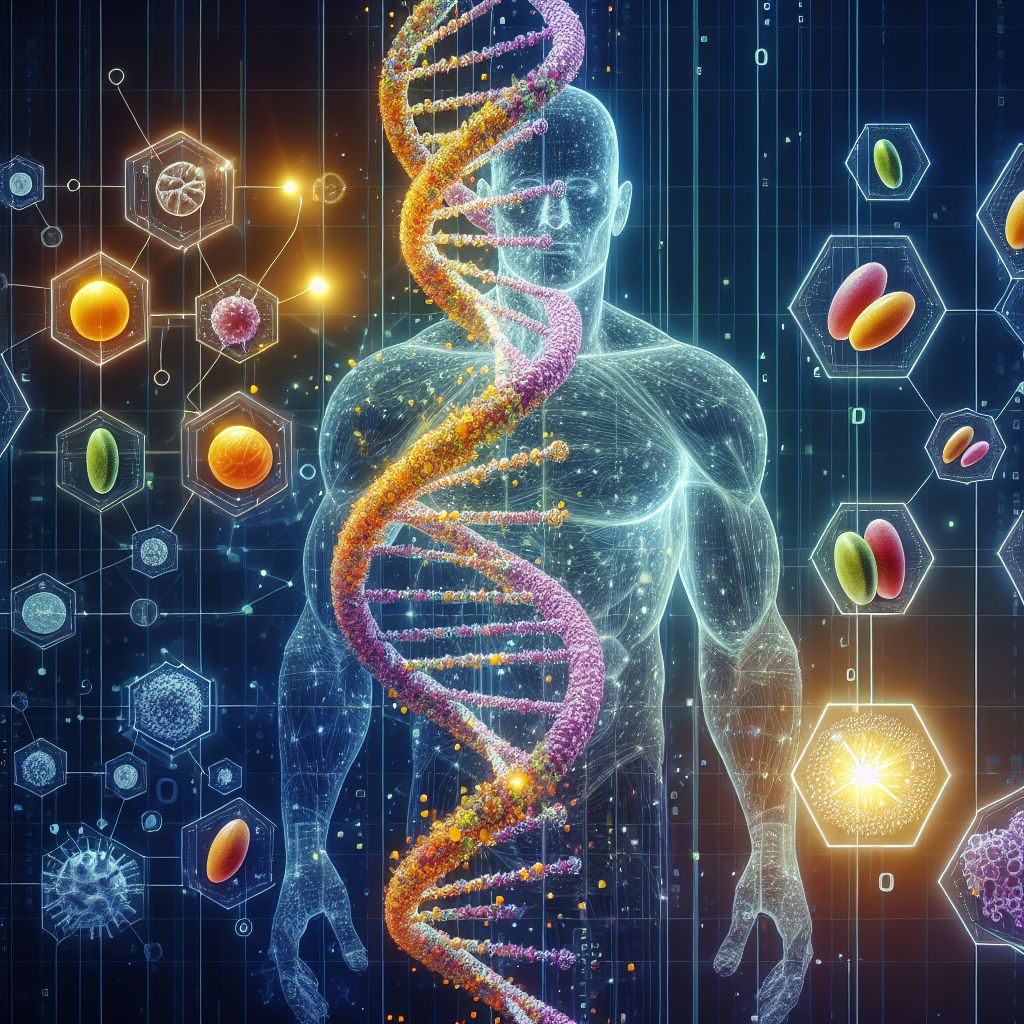Human Design and Vitamins: Personalized Health

Discover your unique Human Design and learn how personalized vitamins can enhance your health. Start your journey towards a healthier you today. Click here to get started.
Exploring the Connection Between Human Design and Vitamin Intake
Human Design, a system that combines astrology, the I Ching, Kabbalah, Hindu-Brahmanic system, and quantum physics, is increasingly being used to understand individuality and personal health. It provides a blueprint of our unique genetic makeup, offering insights into our strengths, weaknesses, and potential health issues. Recently, there has been a growing interest in the connection between Human Design and vitamin intake, with the belief that personalized health can be achieved through a tailored approach to nutrition.
The Human Design system categorizes individuals into four types: Manifestors, Generators, Projectors, and Reflectors. Each type has a unique way of interacting with the world, and by extension, different nutritional needs. For instance, Manifestors are known for their initiating energy and may benefit from vitamins that support their active lifestyle, such as B-vitamins for energy production and Vitamin D for bone health. Generators, on the other hand, have a sustained energy and may require vitamins that support long-term vitality, such as Vitamin C for immune support and Vitamin E for antioxidant protection.
Projectors, who are known for their ability to guide and direct others, may benefit from vitamins that support cognitive function, such as B-vitamins and Omega-3 fatty acids. Lastly, Reflectors, who are sensitive to their environment, may require vitamins that support their immune system and help them cope with stress, such as Vitamin C and B-vitamins.
However, it’s important to note that while Human Design can provide a general guideline, individual vitamin needs can vary greatly depending on various factors such as age, lifestyle, and existing health conditions. Therefore, it’s crucial to consult with a healthcare professional before making any significant changes to your vitamin intake.
Moreover, the Human Design system also provides insights into our digestive profile, which can further inform our vitamin intake. For instance, some individuals may have a high metabolic rate and may benefit from vitamins that support energy production, such as B-vitamins. Others may have a slower metabolic rate and may require vitamins that support digestion and nutrient absorption, such as Vitamin A and D.
In addition to individual types and digestive profiles, the Human Design system also considers the impact of external factors on our health. For instance, it acknowledges the influence of the lunar cycle on our energy levels and nutrient needs. This understanding can help us align our vitamin intake with our natural rhythms, further enhancing our health and wellbeing.
In conclusion, the connection between Human Design and vitamin intake offers a promising avenue for personalized health. By understanding our unique genetic makeup and how it interacts with our environment, we can tailor our vitamin intake to support our individual health needs. However, it’s important to remember that while Human Design can provide valuable insights, it should not replace professional medical advice. Always consult with a healthcare professional before making any significant changes to your diet or vitamin intake.
The exploration of the connection between Human Design and vitamin intake is still in its early stages, but the potential for personalized health is exciting. As we continue to learn more about our unique genetic makeup and how it influences our health, we can look forward to a future where healthcare is truly personalized, helping us achieve optimal health and wellbeing.
Personalized Health: Tailoring Vitamin Regimens Based on Human Design

Human Design, a system that combines astrology, the I Ching, Kabbalah, Hindu-Brahma chakra model, and quantum physics, is increasingly being used to personalize health regimens, including vitamin intake. This innovative approach to health and wellness is based on the belief that each person has a unique design that can be used to guide their lifestyle choices, including their diet and nutritional needs.
The Human Design system categorizes individuals into four types: Manifestors, Generators, Projectors, and Reflectors. Each type has its own specific needs and characteristics, which can be used to tailor a personalized health regimen. For instance, Manifestors are believed to have a strong need for certain vitamins and minerals to support their energy production, while Generators may require a different set of nutrients to maintain their stamina.
The concept of personalized health is not new. For years, medical professionals have recognized that individuals respond differently to various treatments and medications. However, the application of Human Design to personalized health takes this concept to a new level. It suggests that by understanding our unique design, we can optimize our health and wellbeing by tailoring our diet, exercise, and even our vitamin intake to our specific needs.
The role of vitamins in our health is well-established. They are essential for various bodily functions, including energy production, immune function, and cellular health. However, the amount and type of vitamins that each person needs can vary greatly. For instance, some people may require more vitamin C to support their immune system, while others may need more vitamin D for bone health.
By using Human Design, we can gain insights into our individual needs and tailor our vitamin intake accordingly. For instance, a person with a Generator design might benefit from a higher intake of B vitamins to support their energy production, while a Projector might need more vitamin C to support their immune system.
However, it’s important to note that while Human Design can provide valuable insights, it should not replace professional medical advice. It’s always recommended to consult with a healthcare provider before making any changes to your diet or vitamin regimen.
Moreover, while tailoring your vitamin intake based on your Human Design can be beneficial, it’s also important to maintain a balanced diet and lifestyle. Vitamins should not be used as a substitute for a healthy diet, but rather as a supplement to support your overall health and wellbeing.
In conclusion, the application of Human Design to personalized health represents a new frontier in our understanding of health and wellness. By understanding our unique design, we can tailor our lifestyle choices, including our vitamin intake, to our specific needs. This approach not only has the potential to optimize our health and wellbeing but also to transform our relationship with our bodies. As we become more attuned to our individual needs, we can make more informed decisions about our health and take greater control over our wellbeing.
The future of personalized health is promising, and the integration of Human Design into this field is an exciting development. As we continue to explore and understand our unique designs, we can look forward to a future where health and wellness are truly personalized, and where each person has the tools and knowledge to optimize their health based on their unique needs and characteristics.
The Role of Human Design in Determining Optimal Vitamin Consumption
Human Design, a system that combines astrology, the I Ching, Kabbalah, Hindu-Brahmanic system, and quantum physics, is increasingly being recognized for its potential role in personalized health, particularly in determining optimal vitamin consumption. This innovative approach to health and wellness is predicated on the belief that each individual has a unique design, which can be used to guide decisions about diet, exercise, and even vitamin intake.
The Human Design system categorizes individuals into four types: Manifestors, Generators, Projectors, and Reflectors. Each type has a distinct strategy for making decisions and interacting with the world, which can also influence their nutritional needs. For instance, Generators, who constitute about 70% of the population, are believed to have a defined Sacral Center, which suggests they may benefit from a diet rich in whole foods and may require certain vitamins to support their energy production.
The concept of personalized health is not new. For years, medical professionals have recognized that individuals respond differently to various treatments and that a one-size-fits-all approach to health is often ineffective. However, the application of Human Design to personalized health represents a significant shift in thinking. Rather than focusing solely on physical symptoms or genetic predispositions, this approach considers the individual’s unique energetic blueprint.
In the context of vitamin consumption, this could mean that two individuals with similar physical characteristics and lifestyles may require different vitamins or dosages based on their Human Design. For example, a Manifestor might need more B vitamins to support their energy levels, while a Projector might benefit from additional Vitamin D to support their immune system.
This approach to personalized health also emphasizes the importance of listening to one’s body and intuition. According to Human Design, each individual has an inner authority, or decision-making strategy, that can guide them towards the right choices for their health. This could mean paying attention to how one’s body responds to certain vitamins or noticing any changes in energy levels, mood, or physical health after altering one’s vitamin intake.
While the role of Human Design in determining optimal vitamin consumption is still a relatively new field of study, early indications suggest that it could offer valuable insights into personalized health. By considering an individual’s unique design, healthcare professionals may be able to provide more targeted and effective recommendations for vitamin consumption.
However, it’s important to note that while Human Design can provide valuable insights, it should not replace professional medical advice. Individuals should always consult with a healthcare provider before making any significant changes to their diet or vitamin intake.
In conclusion, the application of Human Design to personalized health represents an exciting development in the field of nutrition and wellness. By considering an individual’s unique energetic blueprint, it may be possible to provide more targeted and effective recommendations for vitamin consumption. As research in this area continues to evolve, it will be fascinating to see how this innovative approach to health and wellness shapes our understanding of nutrition and the role of vitamins in supporting optimal health.